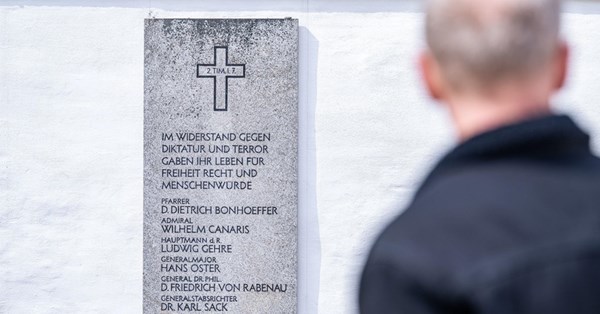GERMAN Protestants have commemorated one of their foremost theologians on the 80th anniversary of his execution during the final days of the Second World War.
“Dietrich Bonhoeffer lived to be only 39 — yet hardly any 20th-century Protestant had such a profound impact on Church and society,” the Evangelical Church in Germany (EKD) said on its website.
“His passionate protest against the National Socialists, his active role in the resistance against Hitler, his books and his death have resonated far beyond Germany’s borders”.
The statement was published as young Christians gathered last weekend at the Flossenburg concentration camp to debate the legacy of Bonhoeffer. His death was also commemorated in a memorial service on Wednesday, as well as in an exhibition and reading of his works.
Speaking at Flossenburg, Bishop Christian Kopp, of the Evangelical Lutheran Church in Bavaria, paid tribute to his “clarity of thought and profound spiritual stance”, and said that Bonhoeffer could provide a role-model at a time when truth was “often distorted and manipulated”.
The president of the EKD Synod, Anna-Nicole Heinrich, praised Bonhoeffer’s resistance to injustice and inhumanity, as well as his “articulate but critical faith”.
“Truth is uncomfortable, but it is our compass — in democracy and in faith,” Ms Heinrich told the weekend gathering. “Bonhoeffer was young, courageous, and credible. He shows us that faith must not remain hidden, but impels us to act out of love for neighbour.”
Born at Breslau, now the Polish Wroclaw, Bonhoeffer studied in Tübingen and Berlin, as well as at the Union Theological Seminary in New York, later ministering briefly in pre-war London before co-founding the German Confessing Church.
Having spoken out against the Nazi regime’s euthanasia programme and genocide of Jews, he was arrested in April 1943 for alleged involvement in a plot to kill Adolf Hitler and hanged at Flossenburg on 9 April 1945.
The life and work of the theologian, whose confidants included Bishop George Bell, are celebrated by the Church of England on 9 April, and his works, including The Cost of Discipleship and Letters and Papers from Prison, are still widely studied.
The EKD said that Bonhoeffer’s “theological texts and life testimonies” still “provoke, inspire and divide”, but remained especially popular in countries where Christians were still resisting authoritarian rule.
















